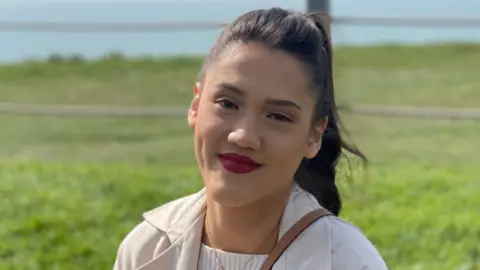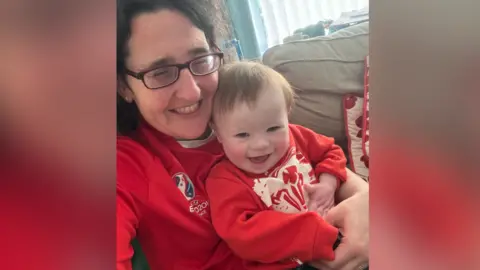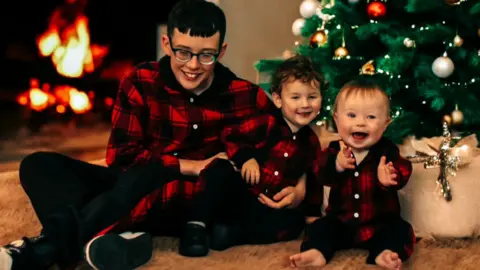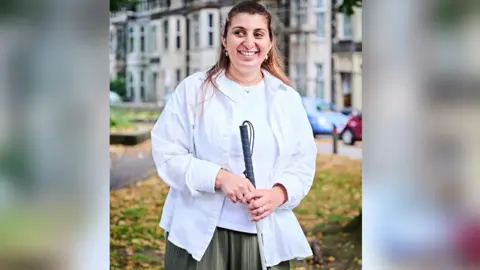'I was told I shouldn't be a mum because I'm blind'
 Jen Troth
Jen TrothJen Troth has always wanted to be a mum, but a medical professional telling her she should not have children because of her sight loss has made the prospect "terrifying".
The 29-year-old social media influencer, who lives in Cardiff, has the hereditary condition retinitis pigmentosa and only has about 10% of her sight left.
She said there needed to be better awareness that disabled people "exist in public life".
Meanwhile, other women with sight loss have said their children had become "confident and caring" people as a result of their experiences.
The Welsh government said it provided funding "to help people with sight loss live confidently and safely".
Ms Troth said she experienced "generational trauma" due to her father and grandmother having the same condition.
Her dad Peter, 74, "was basically told he was unemployable" as a mechanic when he began to lose his sight, forcing him to move to Dubai to start his own business.
"Because of this, I was raised not to talk about my blindness and I didn't tell anyone until I was 24," she said.
"I was afraid to tell employers, to tell friends."
She said safety considerations faced by many women were heightened by sight loss, particularly regarding relationships.
Ms Troth added: "You just have to trust that people in your life are going to be good people when, in a lot of cases, they're probably not.
"I had a previous partner lock me in a room once, to try and 'scare the blindness out of me' and prove I wasn't blind."
 Jen Troth
Jen TrothShe said these issues extended to medical professionals and she was "consistently" told by an eye care consultant that she "should not have children".
"I have always wanted to be a mum. I'm very family orientated," she said, adding she was now "less afraid of going totally blind than being a mother".
She said she worried about coping as a mother, particularly as her partner, who was an engineer, often worked away.
"It's honestly terrifying," Ms Troth said.
"I've not got any peripheral vision - how am I going to see a child running around? How am I going to be allowed to look after a baby by myself? How do I access support?
"You're also constantly thinking 'if I don't have a child soon, will I ever get to see what my child would look like?'"
There are about 2.2m people living with sight loss across the UK and 60% are women.
Until the 1960s, these women were were often considered unfit to parent and some went through sterilisation.
But the Royal National Institute of Blind People (RNIB) said many disabled women continued to fight for respect and support today.
About 41% of blind and partially-sighted women felt there were misconceptions about mothers with sight loss, and 26% believed these were held by health professionals, its research found.
Ms Troth uses social media to raise awareness, visiting hospitality venues and showing what they are like for someone with access needs.
Rhian Morris, from Bridgend, has nystagmus, myopia, and glaucoma and has lived with visual impairments since she was born.
Two of her sons, aged 13 and three, have sight loss, while her one-year-old has Down's Syndrome.
"Stuff like changing nappies, I probably take a bit longer with... buttons and poppers on baby grows, I've lost hope with - I buy ones with zippers now," Ms Morris said.
She said taking her son to school could be challenging "because of people parking on pavements", but she had a symbol on her pram telling people she had sight loss.
 Rhian Morris
Rhian MorrisThe 39-year-old said her phone was her "lifeline" as it allowed her to take photos of things and then zoom in, adding: "I have taken the boys away on my own and done days out on my own because I want the boys to know they can do it.
"If you can't do something, you will find a way around it or you will ask for help."
She believed sometimes people, often well-intentioned, underestimate her abilities, but women with sight loss "shouldn't be afraid" to become mums.
"Anyone has to adapt to having children, it's no different," she added.
 Rhian Morris
Rhian MorrisTafsila Khan, a mum of three from Cardiff who also has retinitis pigmentosa, said her sight deterioration was gradual until her early 30s, after she had her children - none of whom inherited the condition.
The 41-year-old added that, from a young age, her children could look out for the correct bus, order at a cafe, or ask a retail worker for help.
She said: "Taking them to the park and things, I thought would be a challenge, but they've grown up with a mum with sight loss so, for them, that's just the norm.
"It has made them so much more confident... they've had to do things other children didn't, but I feel it's had a positive effect."
 Jorge Lizalde
Jorge LizaldeAnsley Workman, director of RNIB Cymru, said negative opinions towards people with sight loss and "assumptions about their ability to parent" could have a "huge impact on their confidence and access to resources".
"Becoming a parent can bring new and unexpected challenges, regardless of who you are. This doesn't stop parenting from being a hugely rewarding and exciting experience," she said.
"RNIB Cymru is calling for everyone to support mothers with sight loss by making information accessible and dispelling harmful myths."
The Welsh government said the Wales Low Vision Service, provided by optometry practices, was the only service of its kind in the UK and provided more than 8,000 appointments for people with sight loss, of which almost 5,500 were women, in 2023-24.
"We fund a number of organisations to help people with sight loss live confidently and safely, and work with the Wales Vision Forum to improve access to services," it added.
